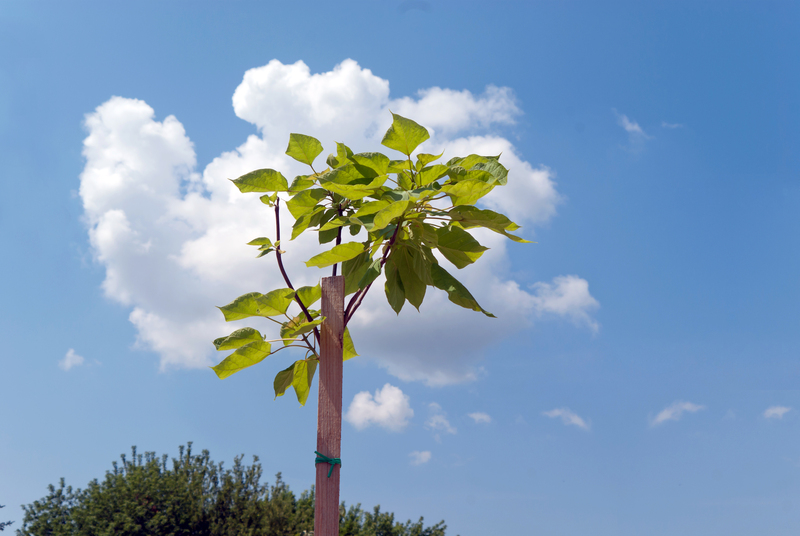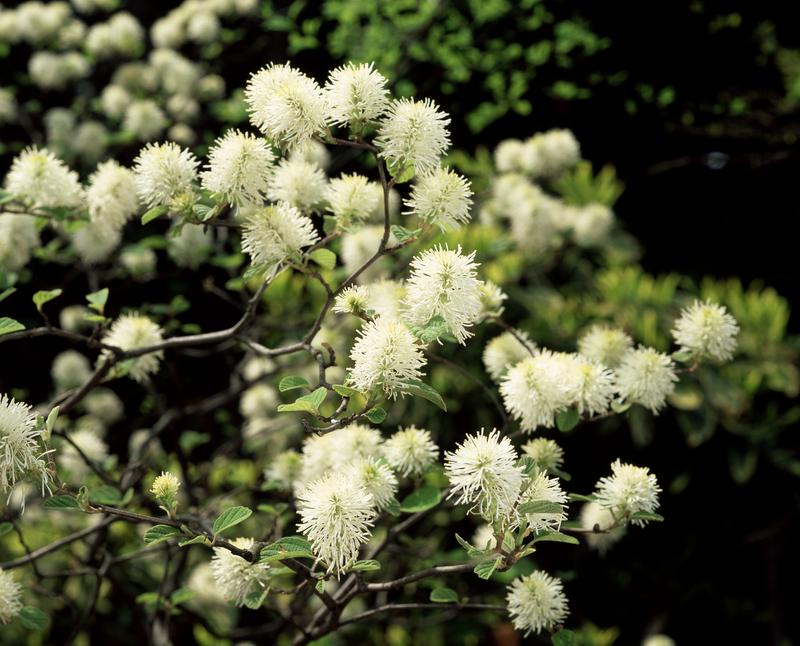Nature's Fragrance: Establish an Herb Garden
Posted on 29/05/2025
Nature's Fragrance: Establish an Herb Garden
The allure of fresh herbs goes beyond flavoring your dishes; it's a symphony of scents and sights that transforms any space. Establishing an herb garden is an enriching journey that gifts you with delightful aromas, culinary variety, and a touch of green serenity in your daily life. In this comprehensive guide, you'll discover everything you need to know about planning, creating, and nurturing your own herb garden --> from choosing the best herbs and locations to ensuring long-lasting vitality and harvest. Dive into the world of nature's fragrance and bring its magic to your home.

Why Create an Herb Garden?
An herb garden is more than a collection of useful plants; it's a source of natural aroma, fresh seasoning, and garden therapy. Here's why establishing your own herb garden is such an inviting prospect:
- Aromatic Atmosphere: Herbs like lavender, basil, and mint each carry a unique, invigorating scent that naturally freshens the air.
- Health Benefits: Many herbs have medicinal properties, supporting wellness in natural ways.
- Culinary Diversity: With access to fresh herbs, your recipes will take on new dimensions of flavor.
- Eco-Friendly Gardening: Herbs often attract pollinators and beneficial insects, supporting biodiversity.
- Easy and Accessible: Establishing an herb garden is ideal for beginners--many varieties thrive in pots or small outdoor beds.
Planning Your Herb Garden: Where to Begin?
Before you head to the nearest nursery or start sowing seeds, strategic planning will ensure your herb garden's success. Consider these crucial steps:
1. Decide on Indoor or Outdoor Herb Gardening
Location is key to thriving herbs and maximum fragrance.
- Outdoor Herb Garden: Offers more space and sunlight, perfect for larger yields and a diversity of herbs.
- Indoor Herb Garden: Great for city dwellers or those with limited yard space. Windowsills, balconies, or even kitchen countertops work well.
2. Select the Right Herbs for Your Needs
Think about your goals for the herb garden--culinary, aromatic, medicinal, or decorative. Here's a breakdown:
- Culinary Herbs: Basil, parsley, thyme, rosemary, oregano, chives, sage, cilantro, dill
- Fragrant Herbs: Lavender, mint, lemon balm, sweet woodruff, chamomile
- Medicinal Herbs: Echinacea, calendula, chamomile, peppermint, lemon thyme
- Decorative Herbs: Variegated sage, purple basil, bronze fennel
Tip: Select herbs you'll actually use. Starting with 4-8 varieties keeps your garden manageable and fragrant.
3. Sunlight and Soil: The Foundation of an Aromatic Herb Garden
- Sunlight: Most herbs need 6-8 hours of direct sunlight--south-facing windows or garden beds work best.
- Soil: Well-drained, fertile soil rich in organic matter is essential. Pots should have drainage holes.
- Watering: Herbs prefer even moisture; avoid soggy soil to prevent root rot.
4. Garden Design for Maximum Beauty and Scent
Arrange your herb bed or containers for easy harvesting and pleasing aesthetics. Mix heights, leaf shapes, and colors for visual interest. Grouping herbs by water and sunlight needs increases their vigor.
- Border Planting: Use low-growing herbs like thyme as borders, with taller rosemary or sage behind.
- Container Gardens: Portable pots allow you to rearrange plants for sunlight or bring them indoors in winter.
- Vertical Herb Gardens: Wall planters and stacked pots are great for small spaces and create lush, scented living art.
Establishing an Herb Garden: Step-by-Step
Step 1: Prepare Your Herb Garden Bed or Containers
- Clear the site: Remove weeds, stones, and old roots from your garden bed.
- Improve soil: Mix in compost, aged manure, or organic soil conditioners to nourish your herbs.
- Select containers: Choose pots at least 6-12 inches deep. Terra cotta allows soil to breathe, but plastic retains moisture better in hot climates.
Step 2: Plant Your Herbs
- Sow Seeds: Fill pots or ground with soil. Place seeds at appropriate depths; gently cover with soil and mist with water.
- Transplant Seedlings: Dig a hole slightly larger than the root ball, place the herb in, fill around, and water gently.
- Spacing: Each herb needs breathability. Give leafy varieties (basil, parsley) at least 12-18 inches; aromatic shrubs (rosemary, sage) 18-24 inches.
Step 3: Care for and Maintain Your Fragrant Herb Garden
Regular care is your ticket to a bountiful, aromatic paradise:
- Watering: Water deeply but infrequently; herbs dislike standing water.
- Fertilizing: Every 4-6 weeks during growth season, add diluted liquid fertilizer or compost tea.
- Pruning: Regularly pinch back stems to encourage bushiness and prevent flowering, which may reduce flavor and scent.
- Disease and Pests: Most herbs are naturally pest-resistant, but remove debris and check for aphids or spider mites often.
Popular Herbs for Scent and Seasoning
Nature's fragrance comes alive with these choice herbs, each adding its signature aroma and flavor to your garden.
1. Sweet Basil
- Aroma: Intensely fragrant, spicy-sweet scent.
- Uses: Essential in Italian cuisine--pesto, salads, tomato sauces.
- Tip: Prune flower buds to keep leaves fragrant and tender.
2. Lavender
- Aroma: Floral, calming, and widely used in aromatherapy.
- Uses: Sachets, teas, desserts, decorative borders.
- Growing hint: Needs full sun and well-drained, slightly alkaline soil.
3. Rosemary
- Aroma: Pine-like, invigorating scent.
- Uses: Roasts, breads, and beautiful evergreen structure for gardens.
- Care: Drought-tolerant, avoid overwatering.
4. Mint
- Aroma: Sweet, refreshing.
- Uses: Teas, salads, desserts, repels pests naturally.
- Note: Grows vigorously--contain in pots to prevent takeover.
5. Thyme
- Aroma: Earthy and subtle, blends well with other herbs.
- Uses: Roasts, soups, stews, as a groundcover in garden beds.
Harvesting and Enjoying Your Herb Garden's Aroma
How and When to Harvest Herbs
- Best Time: Morning, after dew dries but before sun evaporates essential oils.
- Harvesting Method: Use sharp scissors to snip stems just above leaf nodes, encouraging bushier growth.
- Use Immediately: Fresh herbs deliver the peak of nature's fragrance and flavor.
Maximizing Nature's Fragrance Indoors
- Herb Bouquets: Tie bunches of rosemary, basil, and mint for natural air freshening.
- Aromatherapy: Dry lavender or lemon balm sachets for relaxing scents in bedrooms or closets.
- Herbal Teas: Brew lemon verbena, peppermint, or chamomile for soothing moments at home.
Year-Round Herb Garden Care
Keep your garden vibrant in every season with these expert tips:
- Winter: Move pots indoors or provide mulch outdoors to insulate roots. Grow hardy herbs like parsley, chives, and thyme.
- Spring: Sow new seeds, transplant seedlings, refresh soil with compost.
- Summer: Water early in the morning, prune regularly, and watch for bolting (premature flowering) in annual herbs.
- Autumn: Harvest and dry herbs before frost, trim back perennials to promote healthy spring regrowth.
Common Challenges and Solutions in Herb Gardening
Why Are My Herbs Wilting?
- Solution: Check for overwatering or poor drainage--roots rot easily in soggy soil.
Herbs Not Growing Well?
- Solution: Ensure at least 6 hours of sunlight, use organic fertilizers, and avoid overcrowding.
Pests and Diseases
- Common Culprits: Aphids, spider mites, powdery mildew.
- Solution: Spray with water, use insecticidal soap, and encourage beneficial insects like ladybugs.
Creative Ideas for Your Herb Garden
- Kitchen Herb Wall: Hang small clay pots on a wall near your kitchen window for instant access and culinary inspiration.
- Herb Spiral: Build a raised spiral from stones or bricks, layering herbs based on water and sun preferences.
- Herb Pathway: Plant creeping herbs like thyme or chamomile as fragrant groundcover between stepping stones.
- Companion Planting: Pair basil with tomatoes or mint with cabbage to boost growth and deter pests naturally.

Establishing an Herb Garden: Sustainability and Biodiversity
Going green benefits not just your health, but the environment. Planting a bio-diverse range of herbs provides food and habitat for beneficial insects, birds, and pollinators. When you establish an herb garden organically, you reduce chemical use, support cleaner water, and promote ecological balance.
- Native Herbs: Choose local varieties for greater disease resistance and lower water usage.
- Pollinator-Friendly Plants: Include flowering herbs like borage and chives to attract bees and butterflies.
- Compost: Recycle kitchen and garden waste for rich, homemade soil amendments.
Conclusion: Savoring Nature's Fragrance Every Day
Whether you're dreaming of lush windowsills filled with basil and lavender or an outdoor sanctuary ringing with the scents of rosemary and mint, establishing an herb garden is your ticket to nature's fragrance. With mindful planning, care, and a dash of creativity, anyone can turn a few pots--or a patch of earth--into an aromatic, edible paradise. Not only will your space come alive with color and scent, but you'll enjoy the freshest flavors in your kitchen and the wellness benefits that herbs bring to daily life.
Embrace nature's fragrance--start your herb garden today and let the scents, flavors, and joys of fresh herbs transform your home and health.



